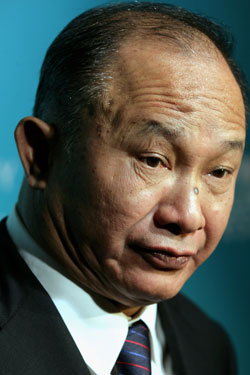
Director John WooÔÇÖs career in Hollywood began with the 1993 Jean-Claude Van Damme vehicle Hard Target, and went on to encompass such massive hits as Mission: Impossible 2 and Face/Off. Now, after fifteen years of toiling in the Hollywood machinery, Woo has returned to Asia, with the medieval war epic Red Cliff, based on a famous battle between three warlords at the end of the Han Dynasty in China. The film, which features some of the most spectacularly elaborate battle scenes that anyone has ever put on film, was released in two two-and-a-half hour parts in Asia, where it broke box-office records. Woo has cut it down to a svelte two-and-a-half hour version for U.S. release. Vulture caught up with him in a SoHo hotel to talk about the importance of Red Cliff to his career, as well as his impressions of his own Hollywood legacy.
Why did you decide to make a shorter cut of Red Cliff for American audiences?
We planned this before shooting. Asian audiences, of course, want to see more ÔÇö itÔÇÖs their story. Chinese, Japanese, and Korean audiences are familiar with this part of history, so we could develop more characters, and pursue more about their relationships. Americans are not as familiar with it. So, we decided to focus on the main storyline and the key characters for this cut. We had some difficulty trimming it down. Also, IÔÇÖve been told that Western audiences prefer foreign films with subtitles that arenÔÇÖt much longer than two hours.
How would you rate your American period? Some big fans of your Hong Kong period were disappointed in some of your American films.
IÔÇÖve had a good experience in Hollywood, and I think IÔÇÖve made a couple of quite good movies. But I do feel a little frustrated with it. ItÔÇÖs really hard to do the things I really want. And also to have the same freedom I had in Hong Kong. In Hong Kong, in China, the director is everything. Same with Europe. Same everywhere, actually, except Hollywood. You can use your own imagination, without any disturbance. In Hollywood, you have to listen to so many people. People in Hollywood, they love to talk. You have to hustle. IÔÇÖm not that kind of person.
So do you feel like you have more freedom now that youÔÇÖre in China?
ItÔÇÖs definitely more simple. I walked into the office, let them know I wanted to make a movie called Red Cliff, and they said okay. I didnÔÇÖt even have to show them a script. I didnÔÇÖt need to take ÔÇ£adviceÔÇØ from anyone. I just shut my door and did my own work
What came first, your decision to work in China, or your decision to make Red Cliff?
IÔÇÖve been dreaming of making this story for years ÔÇö I grew up with it. IÔÇÖd admired all these characters for so many years. About five years ago, I thought it was about time to take what IÔÇÿd learned from Hollywood about making big movies into Asia. Young film-people in China, besides having a great passion for movies, are all eager to learn. They want to learn how to make a big-budget Hollywood movie. For a topic like Red Cliff, this was a great way to learn. For example, I brought a special-effects team from America, and a special-effects team from Korea, and I let them work together and learn from each other.
YouÔÇÖve spoken before about feeling artistically burnt out before A Better Tomorrow came around and revived your career in Hong Kong. It seems as if your career has gone in progressions. Do you think youÔÇÖre entering a new period now?
I think so. IÔÇÖm glad I can keep making movies in China, because I have so many stories to tell. But I do also want to make some other American films. The thing is, in my Hong Kong films, and in my American films, I used to like the tragic hero. Most of the time, I was thinking of myself. Now IÔÇÖm getting older, more concerned about the world, about other people. I have three lovely children. So Red Cliff is quite different from what IÔÇÖve done before. ItÔÇÖs a movie about other people. Usually, my films have been about one or two people. This film is all about working together, about friendship, brotherhood, teamwork. So, even though itÔÇÖs about war, I feel that it gives an optimistic message to young people, that if they work together, they can overcome any obstacle. This is also very different from other Chinese historical films.


